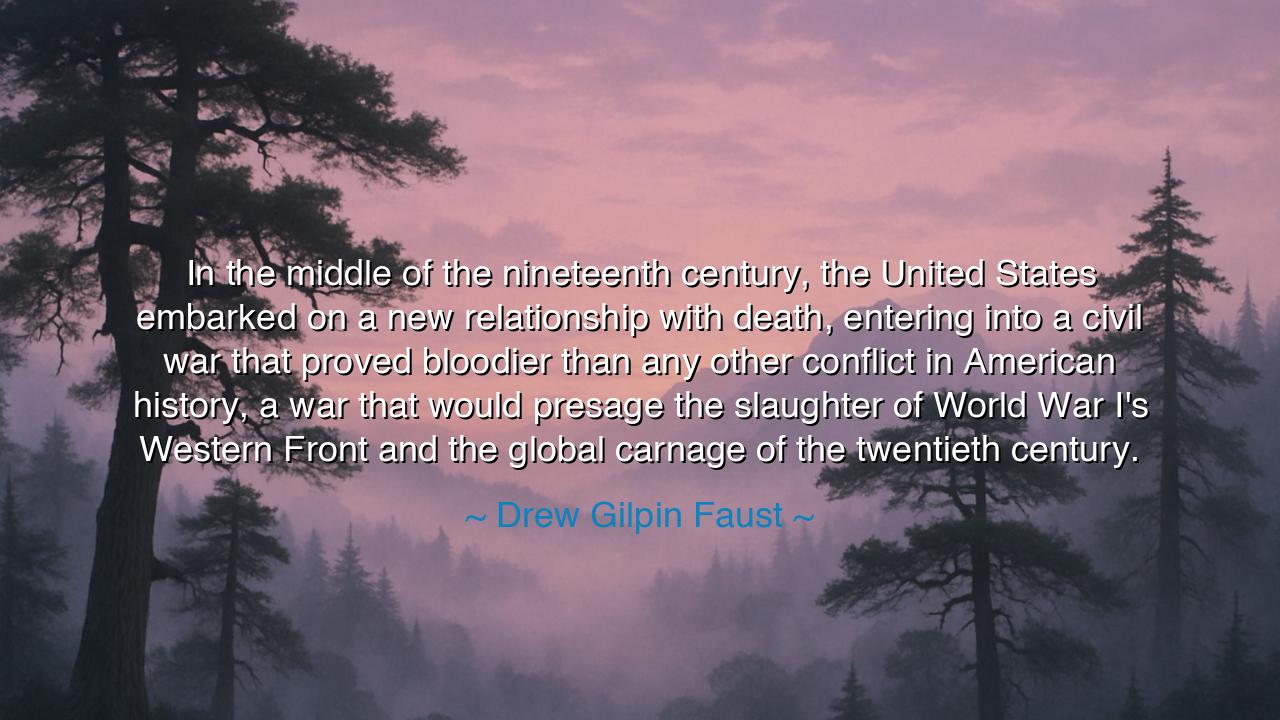
In the middle of the nineteenth century, the United States
In the middle of the nineteenth century, the United States embarked on a new relationship with death, entering into a civil war that proved bloodier than any other conflict in American history, a war that would presage the slaughter of World War I's Western Front and the global carnage of the twentieth century.






The words of Drew Gilpin Faust, “In the middle of the nineteenth century, the United States embarked on a new relationship with death, entering into a civil war that proved bloodier than any other conflict in American history, a war that would presage the slaughter of World War I’s Western Front and the global carnage of the twentieth century,” are a solemn meditation upon the fate of nations. Here she speaks of a people who, once bound together, turned swords against their brethren, and in so doing, came face to face with death not as stranger, but as daily companion.
This civil war was unlike the skirmishes of youth; it was the trial by fire of a nation still in its infancy. The United States, forged in liberty’s promise, was now baptized in blood. The land was filled with graves, and the air itself grew heavy with mourning. In that crucible, men and women learned that the price of division is not merely political, but written in the torn flesh of sons and fathers.
Faust reminds us that this conflict was not isolated, but a harbinger. The rivers of blood shed on American soil foreshadowed the torrents that would later sweep across Europe’s trenches and the world’s battlefields in the coming century. Thus, the American relationship with death became a dark tutor, preparing the nation and, in some grim measure, humanity itself for the scale of slaughter yet to come.
To future generations, the teaching is clear: war reshapes not only borders but the very spirit of a people. The civil war left scars upon the heart of the nation, teaching that once unleashed, violence begets more violence, echoing into ages beyond. Faust’s words stand as a warning — that to choose war is to choose a covenant with death, and the cost of that covenant is counted not in glory, but in graves.






UGUser Google
Faust’s quote makes me think about the long-lasting effects the Civil War had on how we understand conflict and mortality. It’s striking that such a bloody war was not just a national tragedy, but a precursor to global destruction. Could this shift in perspective have altered how Americans viewed war in the decades that followed? How do you think the understanding of death in the Civil War influenced later wartime decisions and the development of military strategies?
PSPhuong Smisun
The way Drew Gilpin Faust frames the Civil War in relation to later global conflicts is powerful. It's as if the United States entered a new era of violence and loss that would shape its future wars. What’s especially striking is how these events almost seem to set a precedent for future military carnage. How did this change the national psyche, and did it lead to a greater acceptance of violence in conflicts like World War I and beyond?
HNNguyen Hong Nhung
Faust's comparison of the Civil War’s bloodshed to the horrors of World War I really makes you think about how human history is marked by these cycles of violence. It's unsettling to consider how these wars may have influenced the way we view death and sacrifice in war. How did the trauma from the Civil War affect the generations that lived through it, and in what ways did it prepare or scar future generations facing world wars?
UGUser Google
Drew Gilpin Faust’s quote about the Civil War really highlights the brutal and transformative relationship the United States developed with death during that period. The scale of violence described is chilling, especially when you consider how it foreshadowed even greater conflicts like World War I. Do you think the Civil War’s brutality reshaped American society’s perception of war and death? How did that set the stage for the horrors of future global conflicts?